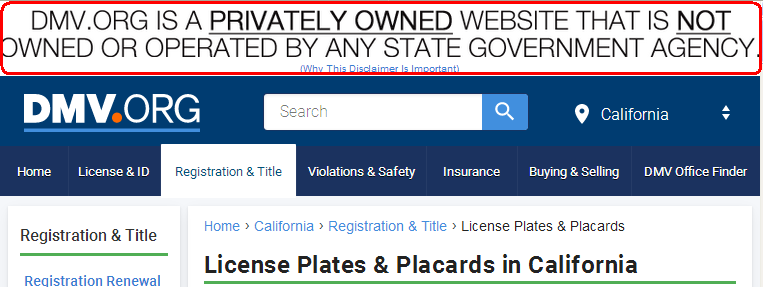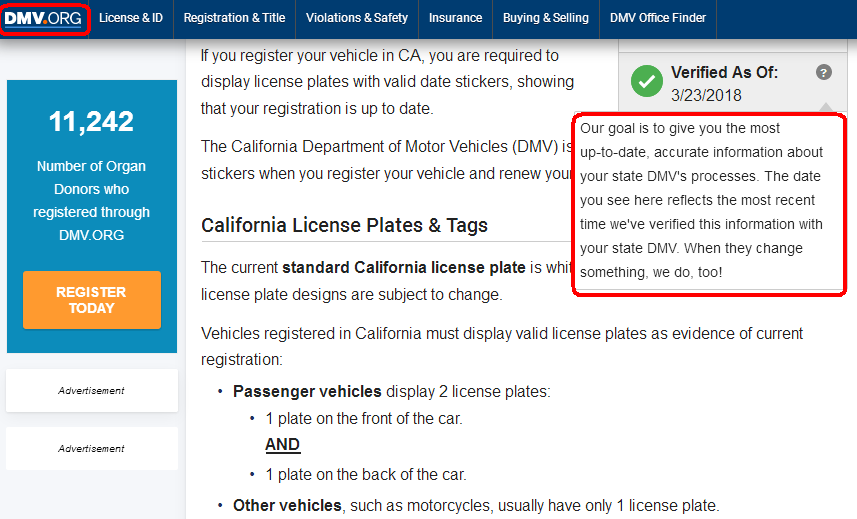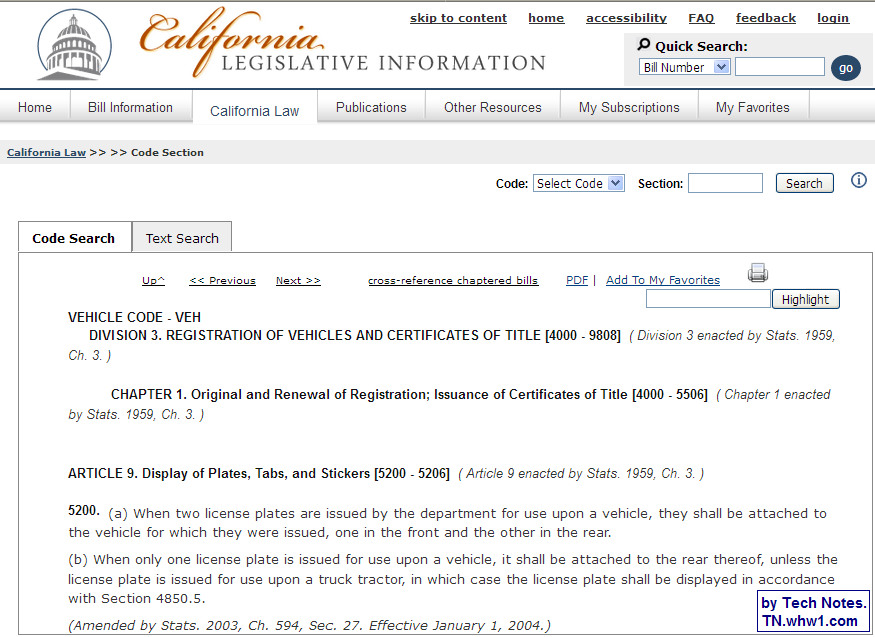
- Details
- Written by Tech Notes
- Published: 23 March 2018
Is DMV.org Wrong?
DMV.org Is Not Related To My State's DMV?
Does California Require 2 License Plates And The Display Of 2 Plates?
Introduction
Because the topic of this article is such a touchy matter, and people may try to use it as legal advice, I need emphasize by stating up front that everything in this article is of my opinion (OMO/IMO) and is not meant to be legal advice of any kind. This article is mostly focused on California's license plate laws and requirements.
Please notice that this site is dependent on financial contributions (donations), and the ads on this website have very little financial contribution towards funding the creation of articles and website operation.
It took about 7 hours to create this article.
Today I was made aware of the crimes that were happening in reference to people getting mislead about California laws and requirements for license plates on vehicles. Especially passenger vehicles.
DMV.org Is Not Related To Any State, Any DMV, And Does Not Represent Legal Law.
It is amazing to me how I am seeing people of all kinds, including professors, attorneys, legal counsel, and even DMV employees refer to false and incorrect statements at dmv.org as if what is stated there is California law. It is done in such a clueless manner, that it is embarrassing, shameful, and in my opinion grounds for a lawsuit when false information of this kind is ignorantly utilized in such manners, and worse, it is spread as if it is correct.
- DMV.ORG IS A PRIVATE ENTITY, and exists to make money from ads and probably from other forms of information collection.
- DMV.org does NOT represent the DMV of any state.
- DMV.org does not represent the state of California, or any state, or any official law.
- DMV.ORG's absolute statement that it is required to have 2 plates on passenger vehicles in California is FALSE.

- There is absolutely no law in California that requires 2 plates for vehicles.
- However, there is a law that requires the display of 2 plates ONLY if your vehicle was the type that was issued 2 plates (this includes most passenger vehicles of recent decades, and NOT older vehicles); your vehicle would also be exempt from needing to display 2 plates if it was of a kind designated to get only 1 plate (this is NOT limited to just motorcycles as dmv.org misleads people to believe).
- DMV.org has realized how their name is giving the wrong impression to the public, and how incorrect information (unknowingly or knowingly) could lead to them being sued, and they are currently trying to make it be known that they are nothing more than somebody's private website.

Here is another interesting and shameful thing I found out today. I've gotten the impression that at least one California DMV employee, if not more, reference the statements at dmv.org on what the law is for license plates, and DMV.org in return checks with California DMV on what the law is. So, the false legal statement is referenced by an employee of DMV using the DMV.org site and the incorrect information is told to other DMV employees, and then when DMV.org checks with California DMV staff, the clueless staff regurgitated or simply confirms the wrong information back to DMV.org. AMAZING! This continues with the wrong information also being dispersed to law officials and professors who in return teach it wrongly and simply regurgitate what they were told wrongly. Both are utilizing wrong sources to check on what the law is for vehicle license plates.
The correct source (the state) for the law is indicated below. Neither the local DMV, or the private website of DMV.org are acceptable sources for checking what the law is. Calling the DMV to confirm Vehicle Code (law) IS NOT VERIFICATION, which is what DMV.org does it seems:
"we've verified this information with your state DMV".
But it's a nonprofit because it's a .org.
Anyone, and any entity can purchase a .org domain, and that entity does NOT need to be a non-profit. A .org can be used just like a .com, .net, etc.
I Was At The DMV, And DMV Employee Told Me 2 Plates Are Always Required In California.
IMO, that employee was unknowingly wrong, and hopefully was not purposely making a false statement to generate funds for the State through their DMV. I am confident that person or any person would not be able to direct you to the specific law that requires you to have 2 plates in all cases, since no such law exists in California. Unfortunately, many people (DMV customers) simply do not want to argue or deal with the headache or time consumption of fighting with a clueless employees who are only pushing what they were told or base their statements on false statements at dmv.org. As a result, large quantities of people pay the small license plate fee, even though they truly were never required to get a second plate and thus not required to pay such a fee.
What happens is that people feel like they are a hostage at the DMV due to the long waiting, and because of this circumstance, the extortion is possible. Often they see it cheaper to pay the money than to have to consume hours of their time and maybe days with forms and phone calls. If wrong information has already spread throughout your local DMV, then it's not going to be easy to find that one knowledgeable person that can set things correct, if that person even cares to do so. That one knowledgeable person may not want to go against that local DMV's herd of employees that are pushing in the wrong direction; he/she could get stampeded, isolated, demoted, etc.
So, What Is The Real California Law For License Plates?
The law is here. The law is very simple, straightforward, and clear for those who understand it's language. A copy of it is also included below for reference (especially if the link changes, which occurs on gov sites), but first a few statements and conclusions from it.
- There's absolutely no broad law that requires 2 plates in all cases, and it seems no law requiring 2 plates in general.
- It is incorrect to make an absolute statement that it is California law to have 2 plates for all vehicles.
- There is no absolute 2 plate requirement in code 5200.
- Only NEWER VEHICLES (recent decades) that got assigned 2 plates are required to have two plates on their vehicle.
- ANY VEHICLE THAT WAS ASSIGNED 1 PLATE is NOT required to have 2 plates or display 2 plates. This means you are NOT required to get that second plate, even if the DMV employee does not know any better.
The LAW.
"
5200.
(a) When two license plates are issued by the department for use upon a vehicle, they shall be attached to the vehicle for which they were issued, one in the front and the other in the rear.
(b) When only one license plate is issued for use upon a vehicle, it shall be attached to the rear thereof, unless the license plate is issued for use upon a truck tractor, in which case the license plate shall be displayed in accordance with Section 4850.5.
(Amended by Stats. 2003, Ch. 594, Sec. 27. Effective January 1, 2004.)
"
People need to realize that DMV employees are people just like the rest of us, and that is simply their job, and they will pass on information to the public of what they think is true or were told to say. Maybe their management got wrong information and thus passed on the wrong info to the employees and those employees simply pass that wrong information to anyone who calls or asks them. That employee does not know any better. Just doing their job. This is why the whole thing is very sad and frustrating for many who know better than the employee of DMV that has somehow gotten the wrong impression that 2 plates are required in the state of California for all circumstances.
Conclusions And Final Answers.
- Does the sate of California require 2 license plates for all vehicles?
No. - Does the sate of California require 2 license plates for all passenger vehicles?
No. - Does the sate of California require 2 license plates for some vehicles?
Yes, ONLY if your vehicle was issued/assigned/given 2 plates.
No, IF your vehicle was issued 1 plate. There is no law that requires you to get a 2nd plate, or display a second plate when you were not originally issued a second plate. Many older vehicle models were assigned only 1 plate by the DMV, and those older vehicles are legally allowed to retain and display just 1 plate in the rear of the vehicle. Possibly negotiated by the manufactures. - Who decides how many license plates a vehicle should have?
This was not clearly indicated in the state code, and I read the whole article. I am going to have to give an educated guess.
The code states "when two license plates are issued by the department for use upon a vehicle......one in the front and the other in the rear". This places the decision making for the number of plates a vehicle gets on the "department". I am thinking the "department" is the DMV. Although it may be some State department. It's possible that the Wholesale/Dealers Code covers this. The relation between the Wholesale and/or Dealers division of DMV together with the manufacturers could possibly negotiate or determine the number of plates a new vehicle design will get upon it's birth (release). It could very easily be a single person at the central DMV or a state department who is assigned the task. It could also be that the task is handled by a small group of people in a small division of the DMV or state government.
So, I am going to guess that the "department", being the DMV, in one way or another, is the final deciding party (through negotiation or not) on what vehicles get 2 plates and which ones get 1 plate upon a new vehicle's release to the public. Most likely a simple database has a listing of these. This means that even new vehicles could get the privilege of having just 1 plate legally. As far as passenger vehicles go, my impression has been that vehicles of recent decades got 2 plates assigned. - Must I get a 2nd license plate for my passenger vehicle?
If your vehicle was originally assigned 1 plate, and at no time during it's ownership (you or prior owner) a 2nd plate got assigned to that vehicle, then no, you do not have to get a 2nd plate.
I am aware that police officers can ignorantly give citations to older vehicles that always had only 1 plate, but you need to explain to the officer before he starts the citation that your vehicle only requires one plate according to the California vehicle code as it is an old car. You can reemphasize that a 2nd plate is not required for your vehicle due to being old and requires only 1 plate. Hopefully the officer realizes the mistake or vaguely recalls something about it from training or talks with others and the doubt is enough to let you go on your way without a citation. Don't expect the officer to confess his mistake as they can be protective of themselves or have an ego or pride. - Do I have to have a license plate on the front of my vehicle?
If your vehicle was assigned 2 plates, then yes, otherwise, no. - Where do the license plates get placed?
I won't get into the technical specifications of the legal code after 5200 (because mostly cared about by manufacturers & custom vehicle builders), but in general for passenger vehicles and most large vehicles:- If you got only 1 plate, then that belongs in the back.
- If you got 2 plates, then one plate goes in the back and one goes in the front.
- Can a vehicle have more than 2 plates or be required to have more than 2 plates?
It seems that you could place more than 2 plates on your vehicle, but no regulation exists for the location of the 3rd plate, but regulation may cover the specific 3 dimensional positioning of the plate (such as height, angle, etc), and regulation may apply to the plate colors, material, and what must show on the plate.
I did not see anything about requirements for 3 plates or more.
How Can You Help Stop The Spread Of Incorrect Information.
- Be brave and speak up. Demand to speak with a supervisor. Call the DMV now and ask for the supervisor, which you most likely will not get, but maybe you can leave a voice message. So, leave a voice message and simply indicating that "California does not require 2 license plates for all vehicles, and many older vehicles and any vehicles that got assigned only 1 plate are exempt from having to get 2 plates, and the DMV is liable for the information they give to people, and you ask that their staff be informed of the correct information". Every voice message of this kind has a major impact on the psyche of the management and thus on that local chapter, and thus on all of DMV.
- Write about it like this.
- Give others this articles web page link. Post this link to your social media, your emails, etc.
- Ask friends that are police officers, attorneys, government officials, judges, DMV employees if they are aware that California does not require 2 plates on all vehicles, and 2 plates are ONLY required when 2 plates were assigned when the car was gotten.
Consider Contributing
- Article Contribution:
Consider submitting an article of your own to Tech Notes. I will create a sub-category for your article if needed. Guest articles are welcome! - Financial Contribution:
If you found this article or any Tech Notes article useful, or beneficial in any form, and you'd like to make a financial contribution as a simple thanks (no fear, any small amount can be given), you can use the Paypal contribution button which is safe and does not require you to have a Paypal account to make a contribution to Tech Notes.
Feel Free To Leave A Good Comment,
And Donate. :)
Comment as a guest or site user.
Polite comments please.
Look around this site and it's menus, and you may find other useful articles.
Add this site to your Bookmarks/Favorites for easy return for new articles.




